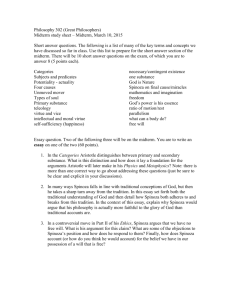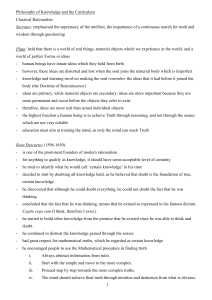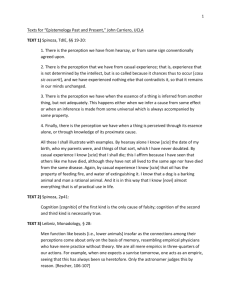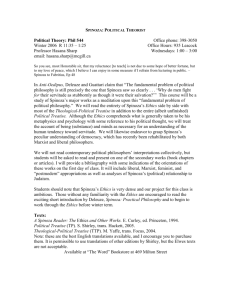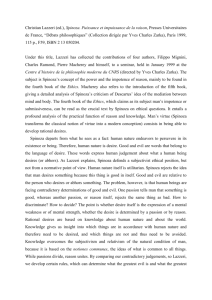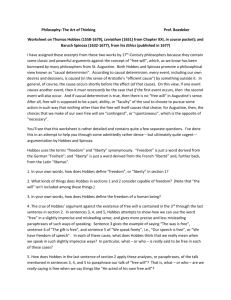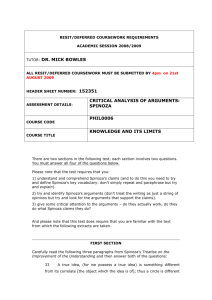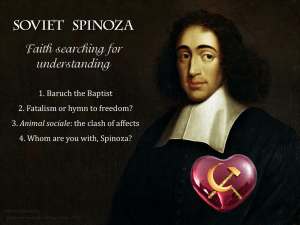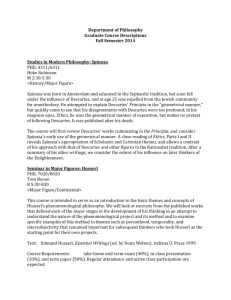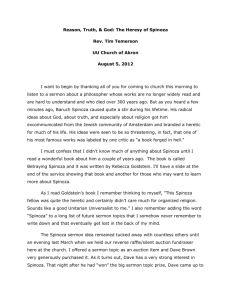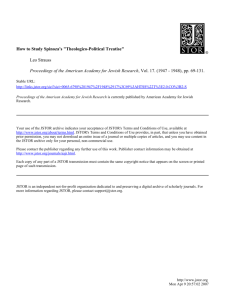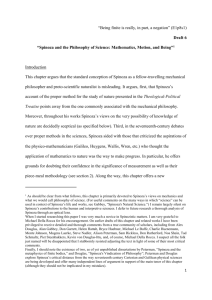spinoza
advertisement
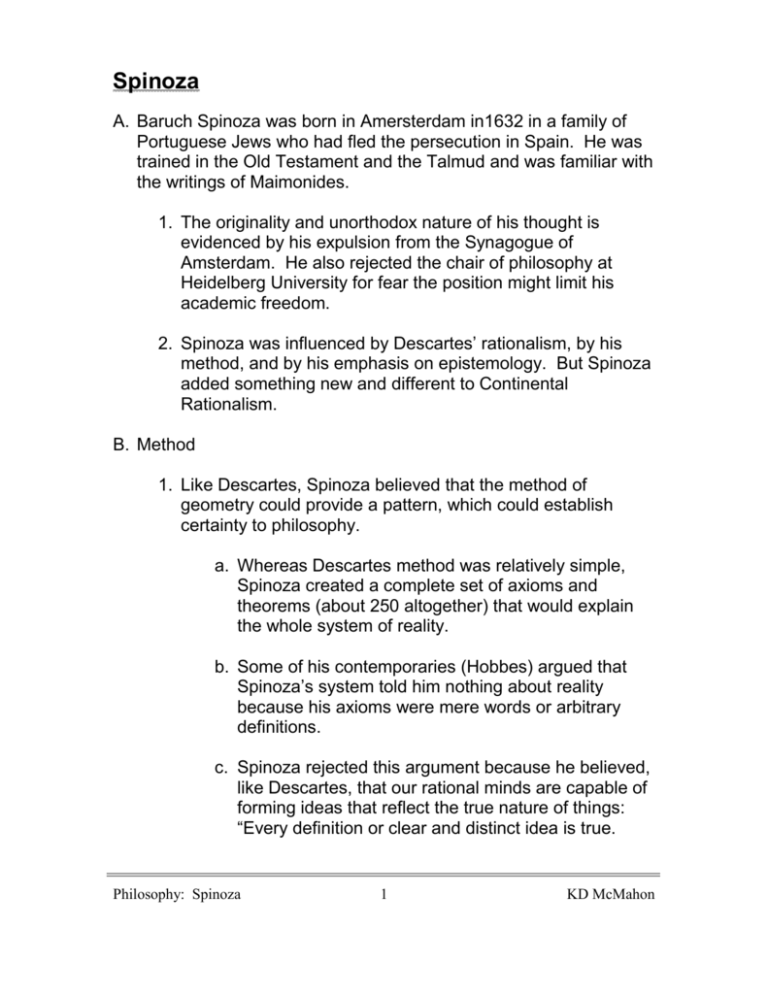
Spinoza A. Baruch Spinoza was born in Amersterdam in1632 in a family of Portuguese Jews who had fled the persecution in Spain. He was trained in the Old Testament and the Talmud and was familiar with the writings of Maimonides. 1. The originality and unorthodox nature of his thought is evidenced by his expulsion from the Synagogue of Amsterdam. He also rejected the chair of philosophy at Heidelberg University for fear the position might limit his academic freedom. 2. Spinoza was influenced by Descartes’ rationalism, by his method, and by his emphasis on epistemology. But Spinoza added something new and different to Continental Rationalism. B. Method 1. Like Descartes, Spinoza believed that the method of geometry could provide a pattern, which could establish certainty to philosophy. a. Whereas Descartes method was relatively simple, Spinoza created a complete set of axioms and theorems (about 250 altogether) that would explain the whole system of reality. b. Some of his contemporaries (Hobbes) argued that Spinoza’s system told him nothing about reality because his axioms were mere words or arbitrary definitions. c. Spinoza rejected this argument because he believed, like Descartes, that our rational minds are capable of forming ideas that reflect the true nature of things: “Every definition or clear and distinct idea is true. Philosophy: Spinoza 1 KD McMahon …the order and connection of ideas is the same as the order and connection of things.” 2. The order of things is of utmost important to Spinoza for to understand a thing one must first know from what that thing originates. And since, as Spinoza believed, reality originates from God, our first questions should be about God and his nature since from that we can deduce accurately about nature, and man. a. Spinoza would reject an empirical approach of science since there is no way we can know God from nature. b. He would have also rejected Descartes’ first principle, I think therefore I am, since this too could not tell us anything about God. C. God: Substance and Attribute 1. Spinoza identified God with the whole cosmos. His famous formula was “God or Nature” (Deus sive Natura) as if to suggest that the two words were interchangeable. “Whatever is is in God, and nothing can exist or be conceived without God.” “God I understand to be a being absolutely infinite, that is, a substance consisting of infinite attributes, each of which expresses eternal and infinite essence.” 2. Both of the above statements seem to suggest that Spinoza was a pantheist. Such a position would indeed get him into trouble with the Synagogue. In any event, Spinoza’s thought revolves around the concept of substance and attributes. 3. Spinoza arrives at the conclusion that the ultimate nature of reality is a single substance. Philosophy: Spinoza 2 KD McMahon a. He defines substance as “that which is in itself and is conceived through itself: I mean that the conception of which does not depend on the conception of another thing from which it must be formed.” b. Substance has no cause other than itself. Furthermore, the very idea of substance demands that it exist: “Therefore from its mere definition its existence can be concluded.” (similar to Anselm’s ontological argument). 4. This single substance has infinite attributes. a. An attribute, Spinoza says, is “that which an intellect perceives as constituting the essence of substance.” b. Spinoza was suggesting that God is that single substance, but what the mind perceives as distinct substances are, in fact, attributes of that single substance. (1) (2) Actually, Spinoza said we can only know two attributes of substance: thought and extension. Whereas Descartes thought that these two attributes showed the existence of two substances, thereby leading him to affirm the dualism of mind and body, Spinoza saw two attributes as different modes of a single substance. c. God is therefore substance perceived as infinite thought and infinite extension. Being infinite, God contains everything. D. The World as Modes of God’s Attributes 1. Spinoza does not distinguish God and the world as though God were the immaterial cause of the material world. For Philosophy: Spinoza 3 KD McMahon Spinoza there is only one substance and God and Nature or interchangeable. Nevertheless, he does make a distinction in regard to Nature. 2. Natura Naturans: Substance and its attributes of God, insofar as God is considered to act by the requirements of his own nature. 3. Natura Naturata: “everything which follows from the necessity of the nature of God, or of any one of God’s attributes…. By natura naturata I understand…all the modes of God’s attributes in so far as they are considered as things which are in God, and which without God can neither be nor can be conceived.” 4. The world is not distinct from God but is God expressed in various modes of thought and extension, of thought and corporeality. a. Everything in the world acts in accordance with necessity since they are determined by God’s substance” “everything which follows from the necessity of the nature of God.” b. The universe unfolds in a determined manner: “in the nature of things nothing contingent is granted, but all things are determined by the necessity of divine nature for existing and working in a certain way.” 5. God is free but we are not. a. God is free, not because he not because he could have willed not to create the universe (he could not since it was in his nature to do so), but because there was no outside agency acting upon him. b. Man however is not free since we are modes of God’s substance and must act in accordance with that substance. Philosophy: Spinoza 4 KD McMahon c. All modes of God’s attributes are fixed from eternity, for “things could not have been produced by God in any other manner or order than that in which they were produced.” d. All the things we experience “are nothing else than modifications of the attributes of God [Nature], or modes by which attributes are expressed in a certain and determined manner.” 6. Because everything is eternally as it must be, and because particular events are simply finite modifications of substance, there is no direction towards which things are moving. a. There is no end or purpose, no final cause. Neither the universe or man is pursuing purposes; they are only doing what they must. b. This “truth might have lain hidden from the human race through all eternity, had not mathematics, which does not deal with final causes but with the essences of things, offered to men another standard of truth.” c. And the truth is that all events are a continuous and necessary set of modifications of the eternal substance, which simply is. Thus, Spinoza had reduced the biological and the spiritual to the mathematical. E. Knowledge, Mind and Body 1. Spinoza distinguishes three levels of knowledge and describes how we can move from the lowest level to the highest. a. We begin with the most familiar things: “the more we understand individual things the more we understand God.” Philosophy: Spinoza 5 KD McMahon b. By refining our knowledge of things we can move from imagination, to reason, and finally to intuition. 2. Imagination: At the level of imagination our ideas are derived from sensation. These ideas are specific but they are vague and inadequate. Although imagination is necessary for practical life this is not the level of true knowledge. 3. Reason: Reason is scientific knowledge. At this level a person’s mind can rise above immediate and particular things and deal with abstract ideas, as it does with mathematics and physics. At this level knowledge is adequate and true. 4. Intuition: Through intuition we grasp the whole system of nature. At this level we can understand particular things we thought we knew on the first level, but now we see them as part of the whole scheme of the universe. When we reach this level we become more and more conscious of God and hence, “more perfect and blessed” for through this vision we grasp the whole system of Nature and see our place in it.” F. Ethics 1. Spinoza looks at “human actions and desires exactly as if I were dealing with lines, planes, and bodies.” This is consistent with his mathematical view of Nature and humanity as a seamless part of that nature. 2. Because man is part of Nature freedom and choice is an illusion. 3. All people possess a desire to continue in their own being. This drive Spinoza calls conatus. When this conatus refers to the mind and body, it is called appetite, and insofar as appetite is conscious, it is called desire. Philosophy: Spinoza 6 KD McMahon a. As we become conscious of higher degrees of selfpreservation and perfection, we experience pleasure, and with a reduction of such perfection, we experience pain. b. “By good I understand here all kinds of pleasure whatever conduces to it, and more especially that which satisfies our fervent desires, whatever they may be. By bad I understand all kinds of pain, and especially that which frustrates our desires.” c. There is no intrinsic good or bad. We simply call something good if we desire it and bad if we dislike it. 4. Spinoza’s ethics resembles that of the Stoics who also argued that all events are determined. The Stoics called for resignation and acquiescence to the drift of events. a. Spinoza tells us that through our knowledge of God we can arrive at the “highest possible mental acquiescence.” b. Morality, therefore, consists of improving our knowledge by moving from the level of confused and inadequate ideas up to the third level of intuition, where we know the perfect and eternal arrangement of all things in God. c. Only knowledge can lead us to happiness for only through knowledge can we be liberated from the bondage of our passions. We are enslaved by passions when our desires are attached to perishable things and when we do not fully understand our emotions. d. Knowledge can liberate us from passions and from it “arises the intellectual love of God. From this kind of knowledge arises pleasure accompanied by the idea of God as cause, that is, the love of God; not in so far Philosophy: Spinoza 7 KD McMahon as we imagine Him as present, but in so far as we understand Him to be eternal; this is what I call the intellectual love of God.” e. This type of love is not a love for a Person, but the kind of satisfaction we experience is solving a mathematical problem. Philosophy: Spinoza 8 KD McMahon
